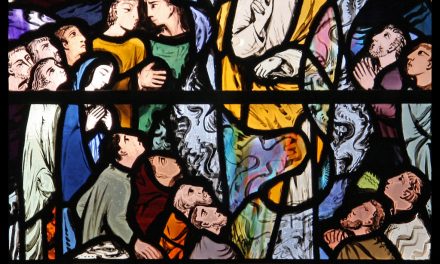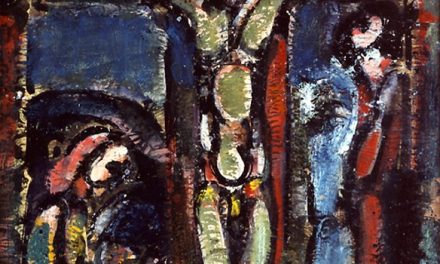Numbers 11:25-29
Psalm 19
James 5:1-6
Mark 9:38-43, 45, 47-48
Jesus’ words in the gospel reading this Sunday are jarring, to say the least. If put in the form of a dialogue, they become almost comical:
“Does your hand cause you to sin?”
“Uh, well, sometimes I suppose.”
“Then cut it off. It’s better to have one hand than to burn in hell with two. Oh, and what about your eye? Is it ever a vehicle for sin?”
“Um, yeah; I mean if you’re really serious about that whole ‘looking with lust’ thing. Which eye do you mean, by the way?”
“Then pluck it out. Having eyes won’t do you any good when you’re burning in hell…”
“Wait, what? Really, Jesus? Give me something to work with here! Aren’t you being a little extreme? I mean, are you really that much of a perfectionist? Do you really expect me to follow through here and amputate parts of my body? You can’t be serious; you’re being funny, right? Oh, I know: I learned about what you’re doing here in Theology class. You must be employing hyperbole: that time-honored literary device in which you exaggerate to make a point. All this talk of self-mutilation is all for rhetorical effect, right? Right?!”
It’s interesting that this passage, so exacting and particular in its demands, should follow upon the first reading for this Sunday which emphasizes God’s seemingly contrary capacity for transcending set boundaries of inclusion. Eldad and Medad were not “in bounds”; they were not where they were supposed to be when the Lord’s spirit came to rest on the elders, but as it turns out God’s spirit was able to bridge that gap and fall upon them anyway.
Likewise, we hear earlier in the gospel reading that Jesus embraces those who work in his name, even if they are not part of his officially chosen cadre. To the question of whether or not to oppose a particular unauthorized vigilante driving out demons in his name, Jesus replies “”Do not prevent him. There is no one who performs a mighty deed in my name who can at the same time speak ill of me. For whoever is not against us is for us.” The Spirit blows where it wills, and obliterates the human boundaries which we all too often draw in order to domesticate and manipulate “God’s will.”
This gospel also follows upon last week’s readings, which unambiguously denounced ambition and rivalry as a ruling paradigm for viewing and acting in the world. As Kathryn Getek-Soltis so compellingly put it last week, the readings propose a view of the world in which
“the good is known in and of itself, [and] not by comparison to inferior goods. And so it is with love as well; it doesn’t require the experience of the unlovable in order to know what ought to be loved. Truth, beauty, love, goodness . . . these are the goods offered by God in a way that makes competition nonsensical. Here, success – or to the point, salvation – defies the logic of rivalry.”
God’s gifts do not obey any law of conservation which would mandate the bestowal of the good here come at the cost of an equivalent withdrawal of the good there. On the contrary, the good that comes from God is infinitely creative and self-diffusive, extending well beyond any boundaries or expectations we set for it. For those who embrace the gift of God’s Word incarnate, the question can never be either that transcendent, eternal good or this finite, temporal good. There is no corner of creation to which God’s goodness is not meant to extend.
So why, then, all this talk of bodily amputation in order to avoid sin? Does it not seem unacceptably self-abusive and dualistic for a God whose goodness depends in no way upon contrast (since there is ultimately nothing with which one could contrast it)? Why not both sanctity and the preservation of my hands and eyes? Aren’t we being a little drastic here?
At the end of the day I too want to run to a rhetorical reading of Jesus’ words, but at the same time I feel as though too quick a turn in this direction would deprive the text from giving as much pause to my cheerful both/and as it perhaps should.
The verse that really gets to me is the one that says “Whoever causes one of these little ones who believe in me to sin, it would be better for him if a great millstone were put around his neck and he were thrown into the sea.” The reason that verse gets to me is because it gives appropriate expression to the rage I feel whenever I hear about the abuse of children. Even well after the point where its novelty value should have worn off, I am still shaken and infuriated by the continuing newsfeed of stories about those who physically hurt and psychologically maim the children entrusted to their care. I feel guilty about it sometimes, though—the harm I wish these people. I often wonder if by feeling so angry, I am actually falling prey to the same forces that perpetuate the violence that so angers me.
And I wonder: how does God respond? How does our Lord perceive the cry of the child who is fed to the vortex of another’s sin? It is at this point, in the face this kind of evil, that the extremity of Jesus’ words seems to express something substantive about “the heart of God.”
Yes, God’s goodness does not in itself depend upon any contrast or opposition, but that in no way obviates the fact that there are indeed many things in the world which do oppose the goodness of God. While it is good to remember that God’s goodness is essentially non-contrastive, we should not on that account be lulled into thinking that “everything is OK” or that “everybody wins in the end.” The movement of God’s spirit is to move beyond our arbitrary boundaries, but we should never for a moment consent to the thought that “we are all in fact on the same side.” The metaphysical both/and does not and should not dismiss us from the prophetic and practical either/or.
God’s plan is to draw us all together, as a shepherd gathers his sheep. Yes, indeed. But woe to whoever and whatever stands in his way! While our ultimate unity and enjoyment of his goodness does not depend upon our mutual opposition to anything apart from God, the God of Israel nevertheless hears the cry of the poor and does not forget the injustice done to them. Their blood cries out to him from the ground, and since he is just he will respond. He does not forget his own, even if we do our best to obliviate them: the poor, the powerless and those who stand in the way of our own success and comfort.
We are all called to receive his spirit and “to be perfect even as the Father is perfect.” Yet that is not simply one option among many. It’s the only show in town. The mystery of our freedom allows us to stand in the way of this love, but in the end it would in fact be better to lose all our limbs than to suffer that fate. Even if we rightly condemn any and all self-mutilation, it remains objectively true that it would be better to sacrifice every worldly good than to stand in the way of God’s relentless love, which is the ultimate source and meaning of those goods. His justice is identical to his love, but let us not think for a moment that his justice will be denied.





To me this points to “unless a seed falls to the ground and dies…” and “when one died, all died.” Jesus is pretty clear that before there is regeneration there is… death. So if death is already required, what is dismemberment?
Does that mean to actually cut off your hand, or pluck out your eye? No, because Jesus has provided a better way. In baptism we die, and are raised to life in faith. Baptism God’s guillotine. So baptism is a more severe “penalty” than dismemberment. The prerequisite to faith is “take up your cross,” reject the lie of the world, flesh, and devil and take on the Word of Christ. The one who has suffered for doing right is no longer a slave to sin… And cooperation with the cross of Christ is essential to faith.